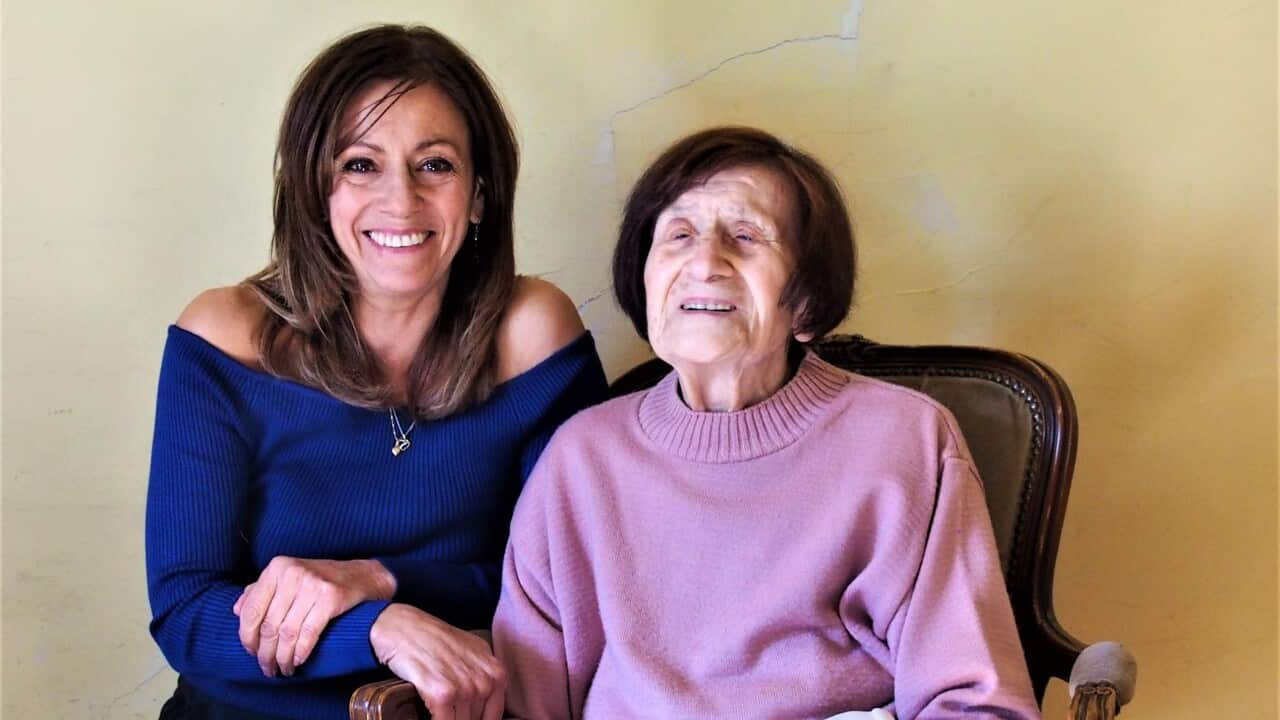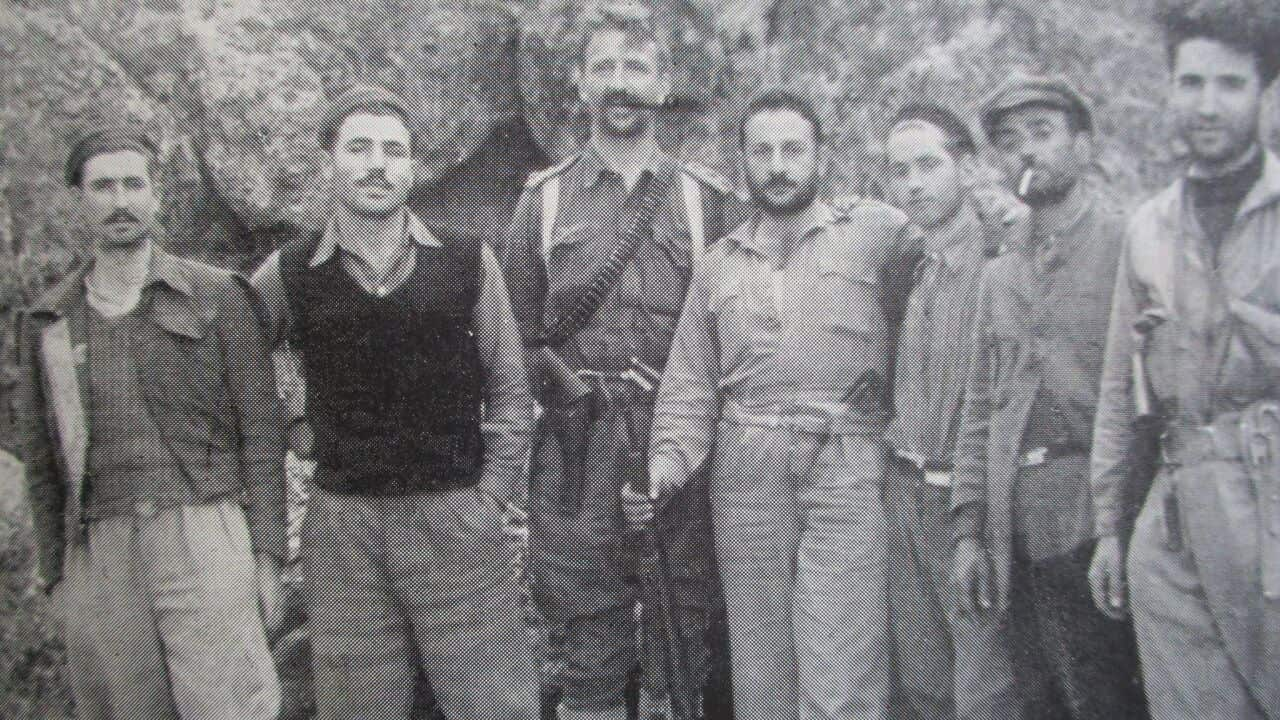Key points
- At 97, a Greek-Cypriot migrant had her memoir published revealing publicly for the first time years of abuse
- Maria Avraam migrated to Australia in the 1950s raising her three children as a single mother while working
- Her daughter says talking about abuse is still taboo for older generations in the Greek community
It took more than ten years for Helena Kidd to turn her Greek Cypriot mother’s diaries into an English memoir.
But the long process had already paid off the moment she saw her reaction.
“The day I handed Maria a printed copy of her story was a day of triumph,” Helena Kidd tells SBS Greek.
LISTEN TO THE PODCAST IN GREEK
LISTEN TO

'A day of triumph': When Maria got a printed copy of her documented personal drama
SBS Greek
07:55
Maria Avraam had been asked by her daughter several times for permission to publish the diary entries in English “to make sure she was OK with others knowing what she called her shameful detailed past.” For over five decades, the first-generation migrant was tormented by memories of physical and psychological abuse, both in her homeland Cyprus, and Australia.
For over five decades, the first-generation migrant was tormented by memories of physical and psychological abuse, both in her homeland Cyprus, and Australia.

Maria Avraam in Brunswick. Melbourne, 2021. Source: Helena Kidd
The only outlet for these was a diary she kept hidden from everyone, including her three children she raised for most of the time as a single mother.
Ms Avraam, today aged 97, was 64 when she started writing. “More than ten years ago I found her writings in a draw, in the form of poetry, and diary entries,” Ms Kidd says and recalls asking her mother what it was as she could not read Greek.
“More than ten years ago I found her writings in a draw, in the form of poetry, and diary entries,” Ms Kidd says and recalls asking her mother what it was as she could not read Greek.

A couple of pages from Maria Avraam's diary. Source: Helena Kidd
Maria said ‘It is my life story. I had to write it down because if I didn’t, I believed I would have gone crazy, or sunk deep into depression by keeping the torments and angst inside of me.’
The ‘curse' of being born a female
Born in 1923 in Skarinou, a village in the Larnaca district of Cyprus, Maria had struggled from a young age with the “constraints of her culture in being a female”, according to her daughter.
“Maria reveals in her story how being born a female in those times was a curse,” she says stating she is “appalled” about the treatment her mum had endured by her own “controlling” mother. “I knew my yiayia was difficult to deal with or even communicate with as we all lived together for many years in the same house.
“I knew my yiayia was difficult to deal with or even communicate with as we all lived together for many years in the same house.

Maria's grandmother Eleni (seated) and Maria's father George, her mother Dimitra and a boy known to the family. Source: Helena Kidd
“She [my mother] was being treated like a slave tasked with all the house chores for being the only girl among her siblings and didn’t go to school.”
Shortly after her arranged marriage, Maria's husband left Cyprus to pursue a life in Australia. “Her marriage was like drawing up a contract of sale. Love was not part of that contract.”
“Her marriage was like drawing up a contract of sale. Love was not part of that contract.”

The neighbourhood of Skarinou village in Cyprus, where Maria Avraam grew up and lived until early adulthood. (Photo c.1978) Source: Helena Kidd
The couple reunited six years later when Maria migrated to Melbourne in 1957.
The relationship was marked by mental and physical abuse before it ended abruptly when her husband abandoned her to live with another woman - one day before the family’s third child was born.
Helena Kidd was three years old when her father abandoned the family of three children at their Richmond house.
“I knew nothing about him, my mother wouldn’t speak about him, everything was kept secret and put down to her writings,” she says. Maria documented in her diary the day she gave an edited version to 12-year-old Helena of her father’s story.
Maria documented in her diary the day she gave an edited version to 12-year-old Helena of her father’s story.

Maria Avraam on her wedding day in Cyprus. Source: Helena Kidd
She opened up after the teenager had an asthma attack and apparently confirmed to the GP she was longing to learn about her dad.
‘Madam, where is this child’s father? The child is suffering and needs to know. If she doesn’t, I cannot tell you if she will get better”, the doctor advised Maria.
I told her only part of the story, withholding many of the details that I could not speak about to anybody. The humiliation the verbal abuse, the rape.
“He was like a beast. He hurt me and held me down so I couldn’t move. I was in shock,” she wrote, describing the incident that ended with her bleeding and her husband “tidying himself up” and walking out of the room, “leaving me like I was not there.”
At the age of 64, Maria took a bold step into her ‘emancipation’, borrowing money to buy her own house.
“I don’t know many Greek women of her generation who have done that," her daughter says.
“She has lived the rest of her life without a man by her side […]Maria was content with her own company, finally to do as she pleased.”
Helena recounts her mother's transformation – through her writings – thriving and becoming “a very strong single mother, once she turned her back on an abusive husband”. Though she continued wearing her wedding band for years, “saying she was married when in fact she wasn’t, to protect herself from sexual advances” that persisted at work.
Though she continued wearing her wedding band for years, “saying she was married when in fact she wasn’t, to protect herself from sexual advances” that persisted at work.

Maria Avraam with her children. Source: Helena Kidd
Fast forward to today, the 97-year-old is a proud grandmother of four, with her published memoir ‘When the Past Awakens’ having made it to the shortlist of 2020 Victorian Premier's History Awards.
In Helena’s eyes, her mother was a “liberated feminist ahead of her time in the Greek culture”.
The decision to speak out publicly about the woes of her past was not taken lightly, she says, and is one that any community beyond her fellow Greek Australians hopes can relate to.
It’s not often you hear these stories by women at my mother’s age. But they are so important, and they need to be told over and over. How many women of her generation are still silent victims?




